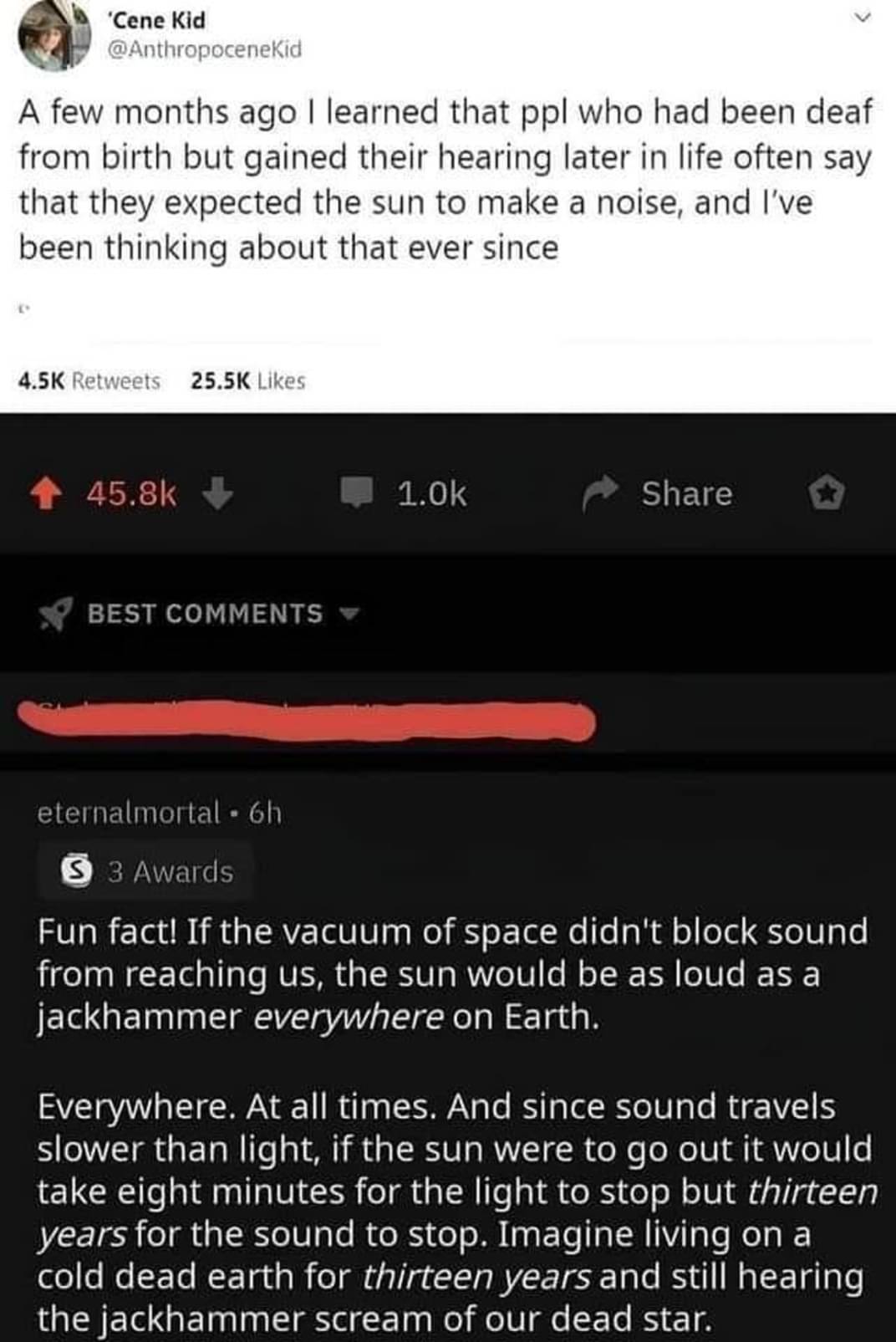this post was submitted on 07 Sep 2024
1399 points (98.7% liked)
Science Memes
11426 readers
2523 users here now
Welcome to c/science_memes @ Mander.xyz!
A place for majestic STEMLORD peacocking, as well as memes about the realities of working in a lab.

Rules
- Don't throw mud. Behave like an intellectual and remember the human.
- Keep it rooted (on topic).
- No spam.
- Infographics welcome, get schooled.
This is a science community. We use the Dawkins definition of meme.
Research Committee
Other Mander Communities
Science and Research
Biology and Life Sciences
- !abiogenesis@mander.xyz
- !animal-behavior@mander.xyz
- !anthropology@mander.xyz
- !arachnology@mander.xyz
- !balconygardening@slrpnk.net
- !biodiversity@mander.xyz
- !biology@mander.xyz
- !biophysics@mander.xyz
- !botany@mander.xyz
- !ecology@mander.xyz
- !entomology@mander.xyz
- !fermentation@mander.xyz
- !herpetology@mander.xyz
- !houseplants@mander.xyz
- !medicine@mander.xyz
- !microscopy@mander.xyz
- !mycology@mander.xyz
- !nudibranchs@mander.xyz
- !nutrition@mander.xyz
- !palaeoecology@mander.xyz
- !palaeontology@mander.xyz
- !photosynthesis@mander.xyz
- !plantid@mander.xyz
- !plants@mander.xyz
- !reptiles and amphibians@mander.xyz
Physical Sciences
- !astronomy@mander.xyz
- !chemistry@mander.xyz
- !earthscience@mander.xyz
- !geography@mander.xyz
- !geospatial@mander.xyz
- !nuclear@mander.xyz
- !physics@mander.xyz
- !quantum-computing@mander.xyz
- !spectroscopy@mander.xyz
Humanities and Social Sciences
Practical and Applied Sciences
- !exercise-and sports-science@mander.xyz
- !gardening@mander.xyz
- !self sufficiency@mander.xyz
- !soilscience@slrpnk.net
- !terrariums@mander.xyz
- !timelapse@mander.xyz
Memes
Miscellaneous
founded 2 years ago
MODERATORS
you are viewing a single comment's thread
view the rest of the comments
view the rest of the comments

so, someone did the math on that?
no vacuum, that means atmosphere. so lets say 1 atmospheric pressure the whole way.
which would be sad, because rain, clouds, ozone layer and countless other atmospheric phenomen would be impossible. so no life on the planet anyway.
https://en.wikipedia.org/wiki/Acoustic_attenuation
how loud is the sun? does anybody know? what is the acoustic pressure on a certain orbit near the sun, iof there is atmosphere?
so, the acoustic presssure needs to reach earth. it needs to travel 13 years.
overcoming this much atmosphere between sun and earth eats energy, since there is a resistance. because there is an atmosphere, see? thats why sound gets softer and softer, the more away you are from the source.
so I guess the whole idea is bullshit.
but i am just a construction worker, maybe someone else will do the math.
i doubt any light rays would make it here. it would be pitch black dark.
the light would be scattered by the atmosphere.
the vaccum does not block sound. it just doesnt transmit it. there is nothing what can block.
same as vacuum does not suck. never. the key is pressure differential, the higher pressure dictates what will happen, not the lower pressure.